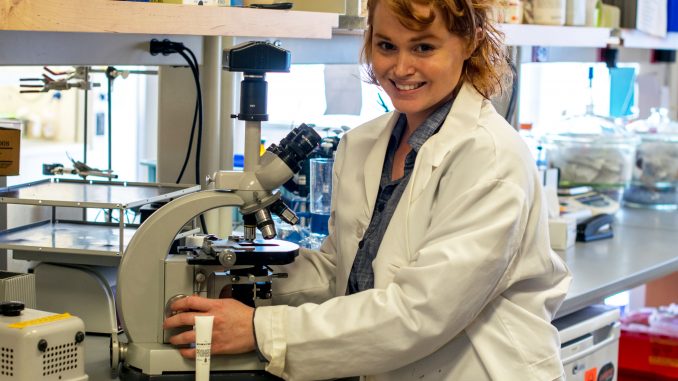
In front of her pre-calculus class, Emily Kight was asked by a high school classmate why she was missing hair.
“I just got up and left to go cry in the bathroom,” said Kight, a junior bioengineering major. “I avoided eye contact a lot with anyone. I was very depressed in school.”
Kight has trichotillomania, or TTM, a disorder that causes those affected to have a strong urge to pull out their hair.
When Kight moved from Florida to Pennsylvania at age 15, the urge to pull at her hair grew stronger due to the stress of relocating. She struggled to find help through therapists and constantly wore hats in public to hide her bald spots.
Through a project in her freshman Frontiers in Bioengineering class, Kight created Prohibere, a leave-in hair conditioner that lessens her urge to pull at her hair.
Last spring, Kight presented her idea at the Fox School of Business’ Be Your Own Boss Bowl, a business plan competition developed by the Innovation and Entrepreneurship Institute. She took second place among 450 ideas, winning a $10,000 prize. Prohibere will be available on the company’s website and Amazon within the next few weeks.
In the bioengineering class, Kight had to come up with a solution to a biomedical problem as part of a semester-long project. Frustrated with the lack of topical products for TTM on the market and inspired by her own experiences, Kight decided to create the leave-in hair conditioner.
“I thought, ‘Why not? I have nothing to lose,’” Kight said. “Oh, wait I do, a lot of hair. So, for me it was like, ‘Let’s do this, I don’t care if it doesn’t work. I’m already here.’”
Kight said it was validating to research TTM for the project because it reaffirmed her belief that the disorder is not just caused by behavioral issues. TTM, or “trich,” also stems from structural abnormalities in brain regions where habitual behaviors develop, she said.
In TTM support groups, Kight saw a lot of people trying to quit pulling their hair cold turkey, which usually ends in relapse, she said.
“It’s really devastating, somedays you just give up, and it’s like months of progress is eliminated in a few hours,” she said. “I thought maybe we should just focus more on sensation interests and developing a tool to help manage those physiological urges.”
Kight tried testing different products on herself, including bee sting ointment and Vicks VapoRub. She found the camphor — a waxy white solid with a strong scent often used in decongestants — and menthol in these products created a numbing sensation on the scalp that relieved her impulse to pull at her hair.
Kight decided to combine menthol and camphor with a hair conditioning formula to create Prohibere, which means “to stop” in Latin. A tube of Prohibere costs $19.95 and has three quarters of an ounce of conditioner.
“I wanted to make something small enough that you could bring it with you and apply easily,” Kight said. “Trich happens everywhere, in the car, while you’re studying at the library. It just happens.”
Kight said she is using her prize money to pay for the manufacturing and production of Prohibere. Kight collaborated with junior engineering majors Linnae Raymond and Michael Kelly in Spring 2017 to launch the startup company Biomaterix to sell the product.
Kight and Raymond met in their Frontiers in Bioengineering class. When Raymond heard about Kight’s success with Prohibere, she told Kight about her own struggle with the disorder called dermatillomania, in which the individual picks at their skin when stressed.
After hearing Raymond’s story, Kight asked her to join Biomaterix over the summer as a research and design engineer.
So far, Prohibere is Biomaterix’s only product for sale, but Raymond said she plans to develop a skin cream to help relieve the urge to pick at skin.
“Body-focused repetitive behaviors don’t really have a market,” Raymond said. “They’re really not talked about.”
“You don’t talk about it, you don’t tell your doctor about it and you spend years embarrassed by it when you could be doing something to help,” she added.
Prohibere is produced at Cosmetic Laboratories, a manufacturing company in Irving, Texas contracted to make the product according to Kight’s formula.
Kelly works on manufacturing, material research and designing product parts.
“I’ve always had a passion for physiology and people’s conditions, so I saw an opportunity here to get into that earlier,” Kelly said. “I wanted to start a company where we can actually make a difference and help people.”
Kight said Biomaterix has 53 pre-orders for Prohibere on its website. She expects orders to increase once the product is available on Amazon, where international customers can also access it.
“I wanted to help people even though I’m sure my product isn’t a one-size-fits-all solution,” Kight said. “It helped me, and so I felt responsible to share my experience. If some kids in school don’t have to hide bald spots or feel ashamed, that will be pretty rewarding.”


Be the first to comment